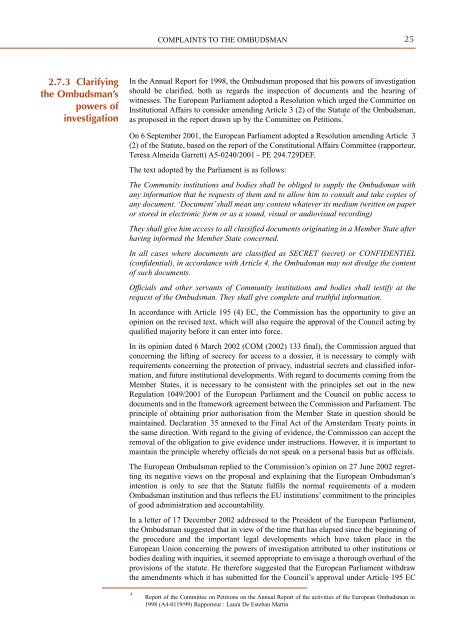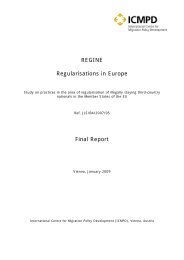Annual report 2002 - EOI
Annual report 2002 - EOI
Annual report 2002 - EOI
Create successful ePaper yourself
Turn your PDF publications into a flip-book with our unique Google optimized e-Paper software.
COMPLAINTS TO THE OMBUDSMAN 25<br />
2.7.3 Clarifying<br />
the Ombudsman’s<br />
powers of<br />
investigation<br />
In the <strong>Annual</strong> Report for 1998, the Ombudsman proposed that his powers of investigation<br />
should be clarified, both as regards the inspection of documents and the hearing of<br />
witnesses. The European Parliament adopted a Resolution which urged the Committee on<br />
Institutional Affairs to consider amending Article 3 (2) of the Statute of the Ombudsman,<br />
as proposed in the <strong>report</strong> drawn up by the Committee on Petitions. 4<br />
On 6 September 2001, the European Parliament adopted a Resolution amending Article 3<br />
(2) of the Statute, based on the <strong>report</strong> of the Constitutional Affairs Committee (rapporteur,<br />
Teresa Almeida Garrett) A5-0240/2001 - PE 294.729DEF.<br />
The text adopted by the Parliament is as follows:<br />
The Community institutions and bodies shall be obliged to supply the Ombudsman with<br />
any information that he requests of them and to allow him to consult and take copies of<br />
any document. ‘Document’shall mean any content whatever its medium (written on paper<br />
or stored in electronic form or as a sound, visual or audiovisual recording)<br />
They shall give him access to all classified documents originating in a Member State after<br />
having informed the Member State concerned.<br />
In all cases where documents are classified as SECRET (secret) or CONFIDENTIEL<br />
(confidential), in accordance with Article 4, the Ombudsman may not divulge the content<br />
of such documents.<br />
Officials and other servants of Community institutions and bodies shall testify at the<br />
request of the Ombudsman. They shall give complete and truthful information.<br />
In accordance with Article 195 (4) EC, the Commission has the opportunity to give an<br />
opinion on the revised text, which will also require the approval of the Council acting by<br />
qualified majority before it can enter into force.<br />
In its opinion dated 6 March <strong>2002</strong> (COM (<strong>2002</strong>) 133 final), the Commission argued that<br />
concerning the lifting of secrecy for access to a dossier, it is necessary to comply with<br />
requirements concerning the protection of privacy, industrial secrets and classified information,<br />
and future institutional developments. With regard to documents coming from the<br />
Member States, it is necessary to be consistent with the principles set out in the new<br />
Regulation 1049/2001 of the European Parliament and the Council on public access to<br />
documents and in the framework agreement between the Commission and Parliament. The<br />
principle of obtaining prior authorisation from the Member State in question should be<br />
maintained. Declaration 35 annexed to the Final Act of the Amsterdam Treaty points in<br />
the same direction. With regard to the giving of evidence, the Commission can accept the<br />
removal of the obligation to give evidence under instructions. However, it is important to<br />
maintain the principle whereby officials do not speak on a personal basis but as officials.<br />
The European Ombudsman replied to the Commission’s opinion on 27 June <strong>2002</strong> regretting<br />
its negative views on the proposal and explaining that the European Ombudsman’s<br />
intention is only to see that the Statute fulfils the normal requirements of a modern<br />
Ombudsman institution and thus reflects the EU institutions’ commitment to the principles<br />
of good administration and accountability.<br />
In a letter of 17 December <strong>2002</strong> addressed to the President of the European Parliament,<br />
the Ombudsman suggested that in view of the time that has elapsed since the beginning of<br />
the procedure and the important legal developments which have taken place in the<br />
European Union concerning the powers of investigation attributed to other institutions or<br />
bodies dealing with inquiries, it seemed appropriate to envisage a thorough overhaul of the<br />
provisions of the statute. He therefore suggested that the European Parliament withdraw<br />
the amendments which it has submitted for the Council’s approval under Article 195 EC<br />
4<br />
Report of the Committee on Petitions on the <strong>Annual</strong> Report of the activities of the European Ombudsman in<br />
1998 (A4-0119/99) Rapporteur : Laura De Esteban Martin
















